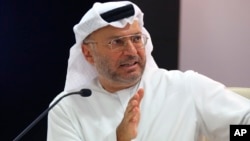A senior United Arab Emirates (UAE) official warned European powers on Tuesday that it was offering Iran a glimmer of hope by trying to keep trade flowing, but that ultimately they would fall behind the United States' tough approach on Tehran.
The UAE, Saudi Arabia and Bahrain swiftly backed U.S. President Donald Trump's decision in May to withdraw from a 2015 international accord with Iran that curbed Tehran's nuclear program in exchange for loosening economic sanctions.
The Sunni Muslim-ruled states are at loggerheads with Shi'ite Iran, fighting a proxy war that has influenced conflicts in Iraq, Syria, Lebanon and Yemen.
UAE Minister of State for Foreign Affairs Anwar Gargash told Reuters at the United Nations General Assembly he was concerned by the public differences between the remaining European signatories to the accord - France, Britain and Germany - and the United States. All of them agree that Iran's long-term nuclear activities should be curbed, its ballistic missile program curbed and its regional influence reigned in.
"The faster we can bridge those opinions the better," Gargash said. "The Iranians are counting on this and perhaps creating a wedge between Washington's approach and the European policy."
U.S. President Donald Trump and Iranian President Hassan Rouhani exchanged taunts at the annual gathering of world leaders on Tuesday with Trump vowing more sanctions against Tehran and Rouhani suggesting his American counterpart suffers from a "weakness of intellect."
The European powers with China and Russia are desperately trying to salvage the nuclear deal and on Monday said they had agreed to set up a special payment mechanism to continue trade with Iran in an effort to skirt U.S. sanctions.
French President Emmanuel Macron said on Tuesday the European efforts would not change the mind of companies that had already left Iran, but would try to provide some economic benefits to Tehran.
"Unfortunately the current disagreement over approach is not helpful and it is giving Iran a sort of lifeline and hope that it can skirt the various concerns that everyone has about Iran," Gargash said.
He said he believed that Trump's pressure policy that will see tougher sanctions restored on Nov. 5 would yield results and that within a year Iran could be at the negotiating table.





